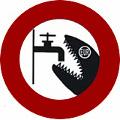
Socialist Party calls public protest over loss of service for homes and health risks
After a 13-day long water supply crisis, tens of thousands of home are without any or regular running water in Northern Ireland. ‘NI Water’ warned that it could be next week before all homes and businesses are reconnected. It said the numbers of those on a curtailed supply could reach 60,000. Three hospitals have been hit by the water supply crisis. Eighty villages and towns have been affected and around 18,000 customers are still affected in Belfast.
N Ireland’s First Minister, Peter Robinson (DUP), speaking after an emergency Executive meeting, on 30 December, was forced to state that "someone had to be held accountable" for NI Water’s "shambolic" and "ineffective" response to the crisis.
In an attempt to pass off full responsibility for the crisis to NI Water, Robinson went on: "If there has been a consistent feature from every minister, it has been their abhorrence at the treatment of customers by NI Water."
Deputy First Minister Martin McGuinness (Sinn Fein) added his voice, stating that NI Water’s performance had been "totally unacceptable behaviour by an arms-length body".
NI Water claims that an unprecedented number of leaks caused by the thaw following the long period of freezing weather over the last few weeks. But it is privatisation plans for NI Water which led to the current crisis.
NI Ireland claims to have invested £150m in water mains over the past three years, replacing 1% of the system. Yet in Britain almost double the amount of infrastructure had been replaced.
The Tory Northern Ireland Secretary of State has indicated that the ConDem Westminster government will use the water crisis to bring about “major changes” in how the NI water supply is financed. NI Water also has plans to sell reservoirs across Northern Ireland. Plans for a water charge (tax) have been raised several times over the last decade, only to be seen off by mass opposition, in which the Socialist Party has played a key role in organising.
The Socialist Party in N Ireland has called a public protest outside the offices of the NI Water on 3 January 2011. In a press statement, below, the SP points out: “This crisis has occurred as a result of the agenda to privatise the water service. NI Water was designed to become a privately-owned company. Two thirds of water staff was laid off and private companies have been running much of our water service for many years now”.
Socialistworld.net
Socialist Party Press Statement:
A protest will be held outside NI Water in Belfast, on Monday 3 January, to demand emergency action to guarantee the immediate reconnection of water to homes.
Protest organisers Pat Lawlor and Paddy Meehan of the Socialist Party explained: "40,000 homes have been without water, some now for weeks. NI Water bosses have completely failed to provide what is a fundamental service. There are serious health risks emerging since people cannot wash themselves nor heat their homes. The scenes of streams of people with buckets collecting water from the River Lagan in Belfast are disgraceful.
"This crisis has occurred as a result of the agenda to privatise the water service. NI Water was designed to become a privately-owned company. Two thirds of water staff was laid off and private companies have been running much of our water service for many years now. These companies’ priorities are to make profits rather than providing a service to meet people’s needs. NI Water should be scrapped and the service should be brought entirely back into the public service. Private companies should be removed from the water service and staff should be re-employed to deal with the wreckage NI Water bosses have caused.
"Ultimately, responsibility for this crisis lies with the Assembly Executive and the Minister for Regional Development. They have stood by and allowed this crisis happen.
Water charges agenda – a new low
"It is shameful that some elements in the media and politicians have used this crisis to push the agenda of water charges while so many people are in distress. They have no support for water charges. We already pay for water and with domestic rates due to rise by 8% over the next four years we will be paying even more for water."


Be the first to comment